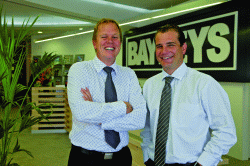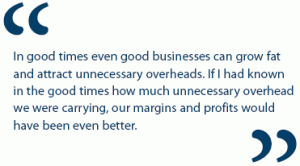Published on the 18/12/2009 | Written by Johanna Bennett

Bayleys’ MD values technology for how it can support business – and the critical information it has brought to the fore during the recession – but real estate is ‘all about people’, says Mike Bayley…[View as PDF]
Third-generation real estate man Mike Bayley is a marlin fisherman in his spare time. He says he “likes the challenge” of fighting the big sports fish, and has chased them from as far afield as the Bay of Islands to way off the wild West Coast down south. He always puts them back though, as it’s just about the sport, he says.
You could view real estate as a competitive sport, although that’s not how Bayley treats it. However, the past 18 months to two years have certainly challenged the managing director, and the family company he runs, as the son and grandson of three of the founders.
It’s a real Kiwi company, he says. It started life in 1973, in his grandfather’s three-bedroom family home in Pakuranga, with his grandmother doing the books, and his father and uncle pitching in to help with sales.
Originally, a commercial real estate operation, although much of the company’s business is now in top-end residential sales, Bayley can’t remember not being in the business. I started erecting real estate signs, and then moved into industrial sales and leasing in Otahuhu.
“Most of my days saw me eating hot dogs in the local burger bars on the Great South Road,” he laughs.
Both Bayley and the company have come a long way in the ensuing 25 years. Bayleys Real Estate now occupies a nice suite of offices in Auckland’s smart Viaduct Harbour precinct.
The headquarters has a commercial purpose though, as it also acts as the company’s auction rooms.
A private company, Bayleys keeps its financial information largely private too, although Bayley did reveal that it averages around $6 billion in transactions annually. The recession saw revenues dip last year by $7-8 million.
The company now employs around 1,200 staff nationwide and quite a number of family members work in the company. Bayley counts off 11, before you get to the coming generation, who come in and work during school and university holidays, starting at the bottom where he did, with envelope stuffing etc – one of his first jobs. He thinks such bottom-up training is a good way to go. The company takes on graduate trainees every year, in its valuations and commercial section.
Recession: reporting is king
Like many companies, Bayleys has been having a tough time lately. “The last 18 months to two years have been challenging times in the business community, particularly in the property sector in New Zealand,” says Bayley.
However, he sees the next 12 months as offering more opportunity for a number of reasons.
In the higher-end residential – the $700,000 to $2 million – bracket, there is an excess of demand over supply. And, while the collapse of the second-tier finance companies that funded most commercial building has devastated this sector, low interest rates for residential loans should fuel the residential market, he says.
Bayley also sees good opportunities in the south of the country and has just opened office in Invercargill to service the rural sector.
The big international
players in New Zealand have been more adversely affected than local operations, he says. They can’t get the funding injections they need from offshore as their parent company is often in trouble.
Upbeat as a good salesman always is, Bayley does however reveal, in a measured way, that the downturn has been pretty painful for his company.
To cope, he has used technology to support the business in a number of ways, most especially to better track costs and unnecessary overheads; to help identify where new opportunities might be, and to reach out to customers at home and abroad, via the web.
Reporting has become almost an obsession compared with previously.
“Every morning I get updates from every office, on deals signed, on new campaigns and settlements; cashflow analysis and deal numbers versus budget,” says Bayley.
 ‘All about people’ – Mike Bayley with fellow director Dave Poole
‘All about people’ – Mike Bayley with fellow director Dave Poole
This all happens before 8.30am, when before the recession much of this information was only digested in the second two weeks of the month. “It’s great to have transparency of information,” he says.
A financial software suite from France, Foreground, is used for financials and deal management. This links into listing system RealNZ, while property management is handled by Portfolio. And, to pull reports together, IBM’s Cognos business intelligence is used, in conjunction with Microsoft CRM reporting.
All this information supports strategic decision-making too, such as where to open a new office, and ensures there are few surprises. Actual market results are revealed, which also highlights where the opportunities are, says Bayley.
This is the most valuable information, he says. Individual office KPIs (key performance indicators) are largely to do with actual versus budgeted deal numbers.
Property love affair continues
For an example of how varied an individual market can be, take the stricken commercial property market. The fact is it’s not equally stricken in all areas. Kiwis haven’t discontinued their enduring love affair with property, particularly as the global financial crisis has further eroded their already shaky faith in equities and the stock market.
Bayley says property investment has served Kiwis very well down the decades, and there are still a lot of private investors looking for commercial property investments, especially now bank deposit rates are so low.
We’re still selling less retail property than three years ago, but if something is well located and providing attractive returns there is interest as there has been very little, if any, softening of yields, says Bayley. The over $10 million market is still strong, he says, while the “under $5 million is red-hot”. However, vacant or development land is impossible to move.
Waterfront dreams
Something that has ratcheted up as a result of the financial crisis however is the appeal of New Zealand as an attractive bolt-hole – for those from the UK and South Africa in particular.
 …not to mention location, location, location.
…not to mention location, location, location.
To better reach these overseas markets, Bayley has been investing in building what is more a sophisticated suite of websites than just a simple online entity. One of its newer websites-within-the website is Waterfront, which was set up in October, complete with a viral email campaign.
Johnny Sinclair, Bayleys’ offshore residential manager, describes the campaign. It was a competition designed to entice potential overseas buyers to sign up for information on beach-front property. The prize was the “ultimate Kiwi dream – a week on a beach-front”. Entrants had to provide the names of five people who might be interested in buying waterfront property.
Over 12,500 people entered the competition, he says.

Bayleys’ various websites allow the company to easily show people the property the company has on offer. Fifty thousand people move to New Zealand every year, says Bayley. “That’s 12,500 dwellings needing to be occupied every year.”
Some of these people are new immigrants, but others are returning expats – quite a number of these now the world economy has turned sour. The Government’s latest initiative aimed at attracting new business migrants is expected to bring yet more people here, he says.
This means investment in the burgeoning website suite will continue, particularly with a view to search-engine optimising it, so people are directed to the site whenever they go online wanting to view property in New Zealand. The company’s web traffic is climbing steadily. It received 100,000 visitors in October, with 16.6 percent coming from overseas.
The websites now consist of Bayleys’ own local site, one for the UK, another for South Africa, a farming website, the new waterfront site, and a leasing site. Then there are three national portals, including one for TradeMe, and four international portals, including, for example, one linking to the hugely popular Rightmove.co.uk.
There are also multiple regional websites, which are now being supplemented by agents’ own mini-sites hanging off these. These allow agents to describe who they are, so personalising the service offered by the regional office.
Many US firms have been doing similar with their staff members for some time. It helps give a real sense of what a firm is, as well as pointing customers to the right person straightaway.
The web is giving Bayleys’ access to an alternate buyers’ pool and allowing it to access global markets more easily.
This is all a far cry from the heady days of the nineties, when agents would jump on a plane and sell whole apartment complexes sight unseen to Asian buyers. People are more discerning today and they usually jump on the plane to view property before buying, says Bayley. But first they view it on the web.
As a result, Bayley says next year will see further investment in web development. Currently, the company uses a whole range of software to support its considerable web presence. This includes the Australian CampaignTRACK, which provides real estate companies with template marketing material to help build websites cheaply and efficiently.
Bayleys’ has also used it to create e-books and is investigating its use for social media add-ons to its website suite. The aforementioned new agent websites are currently being developed with the aid of an off-the-shelf content management system called Kentico, with the help of Datacom.
IT ‘burns’
However, although Bayley appreciates that technology can help in identifying both opportunities to be pursued and costs to be contained – “the accelerator and the brake” – he is cautious about some technology.
“About four-to-five years ago we burnt the best part of $2 million on a custom-built CRM system that proved such a disaster we ended up throwing it in the bin,” says Bayley.
“Stakeholders were not well informed and there wasn’t great buy-in from the sales people.”
So, although the company now uses Microsoft CRM to support sales, Bayley is a little jaundiced about IT investment. “I’ve been cautious in evolving IT since then,” he says.
But he does have confidence in Foreground, to manage the company’s finances and those all-important deals, and in RealNZ to handle its listings database. And there are near future plans to implement an over-arching IT architecture that will allow the company to join up the various different unconnected silos of information that have developed over the years, and streamline this system, says Bayley.
“Innovation and technology is certainly going to be critical to our organisation’s growth in the foreseeable future.
However, first and foremost, we are a service organisation and it’s our people who make the machine work.”
‘Tidy’ future
It’s not only IT that can be “untidy” though. The real estate industry itself has suffered from its own series of personal failures in recent years, in the moral sphere. This is why one of Bayleys’ more immediate tasks is implementing the code of conduct stipulated by the new Real Estate Agents Act 2008, which came into force on 17 November. The act aims to improve the professionalism of agents, some of whom have been accused of unethical behaviour in recent times.
Bayleys’, the company, has not been immune from accusations of less than stellar conduct of late, however. But Bayley, the man, says he welcomes the new code of conduct, which is one component of the new act, as it will “tidy up” the industry. He sees the shoddy behaviour of some as detracting from the industry’s image, and from companies’ reputations. The new act will help protect our company’s brand, he says. “Brand is paramount.”
If I could do it all again…
iStart often asks CEOs and MDs what they know now that they wished they’d known earlier, and what they would do differently.
Mike Bayley makes some heartfelt observations. Starting with: “Life is not a rehearsal… [and] I keep learning every day, taking on new information.”
And, even as a third-generation business leader, he has had to learn the old entrepreneur’s lesson on not doing it all. “I would try not to do everything myself and get other knowledgeable, capable people involved sooner,” he says.
Lastly, the recession has taught him some hard lessons: “In good times even good businesses can grow fat and attract unnecessary overheads. If I had known in the good times how much unnecessary overhead we were carrying, our margins and profits would have been even better. In a way, I am quite grateful to have had the past two years to get under the skin of our business and understand all the parts that make it work, particularly those parts that were irrelevant or redundant and have affected our output.”

|
CEO Gadget Watch: Blackberries are ‘rude’ |
| Gadgets aren’t really a feature of Mike Bayley’s watch. He is first and foremost a people person, he says – at work and at home. He largely leaves the technology that supports the Bayleys’ real estate operation to the specialists he employs, instead taking a helicopter view of the business, seeing all things tech-related as tools to support the business. “We’re in the people game and we need to have as much of a link with them on a daily basis as possible. We don’t make widgets or gadgets. All we do is provide a service. Our people need to understand their [clients] needs and requirements, rather than to be tapping away at a keyboard.” Accordingly, while Bayley is a great fan of the mobile phone, because he talks so much on it – his staple phone is a basic Blackberry – you won’t find him tapping away replying to emails on it. He confines all such activity to the office. In fact, he says he’s turned off the email function on the phone, as “it’s rude to be tapping into a phone all the time.” He actually has two Blackberries but can’t remember the model of either. The second, larger, one he keeps in a cupboard, for use when he goes offshore and has to answer some of the multiple emails that deluge him daily. Otherwise he doesn’t use it at all. “Family is too important. I am of the view that emails can always wait until the next day,” he says. Perhaps the fact that he’s quite a new family man is a factor here. A smiling photo of eight-month old baby “Billy” adorns his desk and his wife now has “another bun in the oven”, he says. However, Bayley does approve of the functionality of his ThinkPad, which he hooks into his rather old and non descript desktop machine when in the office. And, as for Facebook – “I’ve never been on it,” he says with heat. In fact, he almost missed his sister’s 21st birthday party, because she issued all the invitations on Facebook. |
FOR MORE INFORMATION //
> Bayleys
W: www.bayleys.co.nz
































